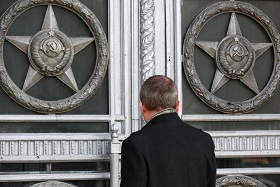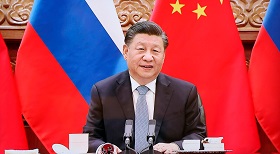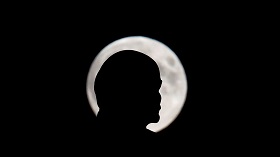The outcome of the ongoing military action in Ukraine is more than decisive for Russia; it is determinant. President Biden called President Putin’s decision “a war of choice”, but what was presented to Russia could hardly be described as a choice. The hidden dimension of the ongoing military operation is no less than an existential war. It is not a war for the existence of Russia: rather, this is a war about the nature of that existence; the nature of Russia’s standing in the world. It is a question of political ontology.
How is Russia to exist—not merely in the world order, but in its immediate neighborhood—is the question at one level. With the West’s escalation, however, the choice also revolves around how Russia will exist within itself; what it will evolve or degenerate into; whether it will be a country that can live with itself and according to its own vision of itself or whether it will have to live in the space and in a manner ascribed to it by the inimical West. This is a struggle for Russia’s identity; its soul.
Russia’s Western dream is currently taking the shape of a delusion or a nightmare. Russia will have to accept the fact that the Western option has receded for a more or less prolonged period. It will have to accept that its own Western character derives from its locus as the Western front of Eurasia. Russia is the only truly Eurasian state, containing both West and East within itself.
A viable Russian grand strategy under the circumstances can only be Eurasia-centric before it aspires to be ‘Greater Eurasian’. In this first stage it should encompass the Global East and South.
In practical terms, the challenge is to square the circle: move towards the equivalent of the Stalin-Mao 30-year treaty of Friendship and Cooperation while reshaping it in a manner explicable and acceptable to India.
The interlock of the U.S.–NATO–EU in the West and the AUKUS in the East can only be balanced off by an alternative Eurasian community or system, with its structures and superstructures, embracing Russia and China, and constituting an alternative antipode or counterpoint.
For Russia, this moment is even more of a hinge in history than most hinges tend to be. The future of Russia, and indeed that of the world order, are at stake. The global game has turned zero-sum. It has been turned zero-sum by Western overkill.
The outcome of the ongoing military action in Ukraine is more than decisive for Russia; it is determinant. President Biden called President Putin’s decision “a war of choice”, but what was presented to Russia could hardly be described as a choice. The hidden dimension of the ongoing military operation is no less than an existential war. It is not a war for the existence of Russia: rather, this is a war about the nature of that existence; the nature of Russia’s standing in the world. It is a question of political ontology.
Ontological War
How is Russia to exist—not merely in the world order, but in its immediate neighborhood—is the question at one level. With the West’s escalation, however, the choice also revolves around how Russia will exist within itself; what it will evolve or degenerate into; whether it will be a country that can live with itself and according to its own vision of itself or whether it will have to live in the space and in a manner ascribed to it by the inimical West. This is a struggle for Russia’s identity; its soul.
Russia lost the Cold War in two phases. First, in Eastern Europe in 1989. Second, in the 1990s, starting with the dissolution of the USSR. The latter was, in the wording of Fidel Castro to Sandinista Comandante Tomas Borge, “suicide, not homicide”. The result of that suicide was the dawn of unipolarity and the shift of NATO towards Russia. Today, Putin’s Russia is expected to commit suicide again by permitting that continued expansion of NATO—even after the U.S. and Ukraine refused to rule it out.
The original expansion of NATO was a reflection of the actual correlation of forces, which includes the subjective factor: the loss of will, as President Putin noted in his Feb 24th 2022 address. Although the U.S. said that no one was talking of Ukraine’s accession to NATO, whether now or anytime soon, the five waves of NATO expansion clearly indicate that such statements are no cause for comfort; only alarm. When the Canadian Foreign Minister could boast on TV about Canada’s beefing up of the Ukrainian military over the years, one could see that Ukraine was being turned into a bayonet at Russia’s throat.
What the West expects of Russia is to continue to permit the expansion—even though the unipolar moment is now over—however, Russia has resurrected, and the global balance has irrevocably changed with the rise of China and the rapprochement between Russia and China. In other words, the strategic offensive posture of NATO, which derives from the moment of unipolarity, was expected to linger in Europe.
When Russia recognized the two breakaway republics of Russian-speakers in Ukraine, following it up with troop infusion, the West could have understood the heightened yet long-standing security compulsions of Russia, considering it as a continuum of the Russian policy since 2014 and an attempt to contain things at that point. Instead, Germany chose to pull the plug on Nord Stream-2, with Anthony Blinken cancelling the meeting with Sergey Lavrov, which was scheduled to be held in Geneva in February—at exactly the moment it should have been held. This was followed by the provocative speeches at the UN General Assembly session on Ukraine.
This has underscored the difference between this Cold War and the classic one. In the 1960s and 1970s, the U.S. and the USSR kept their negotiations going, despite U.S. bombings of Vietnam and Moscow’s move into Prague.
Once Nord Stream-2 was cancelled, there was no longer an incentive for President Putin to stay his hand. Further on, it was clear that the West was no longer concerned with having Russia on-board the world economy.
One thing I found anomalous during my stint in Russia as Sri Lanka’s ambassador in 2018-2020 was the continued reference to the West as “our partners” by President Putin, even when the West was hardly acting or talking in those terms. With President Biden’s speech announcing the latest sanctions, it becomes clear that the aim of the West is to de-link Russia from the world economy—with the expectation of crippling, or according to Western analysts, “destroying” the Russian economy.
The sanctions constitute massive economic retaliation, emerging as the epitome of escalation. It is the modern economic equivalent of the earlier hawkish doctrine of the winnability of a war with Russia. It is intended as a devastating strike, though it will be argued that it is only a second strike after Russia’s first strike when launching the intervention in Ukraine.
That would be a specious argumentation. The sanctions signal the adoption of a strategy of economic eviction as well as a dramatic abandonment of the West’s old strategy of a truly globalized capitalist economy, in which Russia and China are stakeholders. It also signals the abandonment of any vestige of the Kissingerian notion of Russia being a partner in co-managing the world order.
The West has adopted an offensive strategy—while Russia’s intervention in Ukraine, though tactically offensive, remains strategically defensive. This time, the aim of the West is to win; to prevail; to supposedly ‘destroy’ the Russian economy and its scientific-technical base as well as its military, all of which means to weaken Russia’s capacity to defend itself and maintain the essential equivalence in strategic weaponry with the U.S.
The Western hysteria accompanying the latest waves of sanctions has displayed strong negative emotions towards what they see as strong and resolute Russian leadership. The drive behind the sanctions is destructive, aimed at Russia’s economic destabilization, followed by social and political destabilization.
Clearly, the West hopes for a replay of the 1990s and a regime change in Russia, which would lead to a regime of capitulation and appeasement installed in Moscow. If this goal were to be even halfway successful, China would be isolated and the West would return to a situation of world-historical supremacy or predominance in the very least—something it enjoyed in the 1990s.
If the West succeeds, this will mean the subordination of Russia, its subalternity, on the world stage and in the shaping of history including its own future history.
What this would mean in turn is that far from reconciling itself to a world in a transition to multipolarity, the unipolar hegemon would stage the most dramatic comeback in history and a re-establishment of Western hegemony. The 21st century may wind up being, as the 20th century was, “the American century”.
Bluntly put, if the West succeeds, there will be an assumption that unipolarity—the ‘unipolar moment’ in history—continues to prevail, has returned or can be recreated: firstly but not merely, on the European continent, but also globally. As experienced during the ‘unipolar moment’, unipolarity is a polite euphemism for overlordship and monopoly of an effective planetary veto, over which states, systems, regimes and/or leaderships live or die (e.g., Yugoslavia, Libya).
“What is to be done?”
If these are the stakes, how will Russia then react to the question, in the famous words of the most outstanding political mind produced by Russia (who himself was echoing the writer Chernyshevsky), “What is to be done?”
President Putin’s recent speech (Feb 24th 2022) acknowledges that the U.S. is a “system-forming power” and recalls the existence of a “bloc”. This capacity is what is on ample display today.
In the interest of a multipolar world, every bloc requires a counter-bloc, and the task before Russia may be to urgently commence the task of conceptualizing and constructing a counter-bloc, a counter-system or, more correctly, a counter-hegemonic system.
This requires a master-narrative of balance and global equilibrium that must form the political axis of a global ‘system’ or ‘counter-system’ against the kind of global hegemonism, unipolarity and hypocrisy that characterized the post-Cold War period as traced (perhaps, belatedly) by President Putin in his Feb 24th speech.
This compels attention to be paid not only to the narratives of ‘system’ and ‘bloc’ (or ‘counter-system’ and ‘counter-bloc’) but also to ‘structure’. The strength of the West is the building of multiple structures of coordination and overlap. The Post-Soviet Russia has so far failed to keep pace or even compete. That is its Achilles’ heel.
Russian Grand Strategy
Russia’s Western dream is currently taking the shape of a delusion or a nightmare. Russia will have to accept the fact that the Western option has receded for a more or less prolonged period. It will have to accept that its own Western character derives from its locus as the Western front of Eurasia. Russia is the only truly Eurasian state, containing both West and East within itself.
A viable Russian grand strategy under the circumstances can only be Eurasia-centric before it aspires to be ‘Greater Eurasian’. In this first stage it should encompass the Global East and South.
In practical terms, the challenge is to square the circle: move towards the equivalent of the Stalin-Mao 30-year treaty of Friendship and Cooperation while reshaping it in a manner explicable and acceptable to India.
The interlock of the U.S.–NATO–EU in the West and the AUKUS in the East can only be balanced off by an alternative Eurasian community or system, with its structures and superstructures, embracing Russia and China, and constituting an alternative antipode or counterpoint.
Sovereignty & Self-determination
Some problems cannot be avoided but must be grappled with instead. These problems exist in the domains of the conceptual and of political strategy. Grappling with such problems took place during the Soviet period—the formation of academician and thinker Evgeni Primakov belongs to that period—but hasn’t characterized the post-Soviet period in the same manner.
A policy problem with theoretical roots and a clear strategic implication is that of the contradiction between the cluster of state sovereignty, independence, territorial integrity, and unity (on the one hand) and the right of self-determination of national minorities and minority nationalities, who form fairly compact majorities in broad contiguous areas (on the other hand). Without a theory, sufficiently flexible and not schematic, but rather coherent, it will be impossible to bridge the gap in the positions of the Eurasian core-states.
The problem of political strategy that has to be grappled with is that of reconciling the contradiction between the Leninist-Primakovian formula of Russia-India-China (RIC) and the Stalin formula of 1950-1952 of Russia and China not merely standing ‘back-to-back’ but forming an alternative world market and world economy.
Parallel World Markets
At the risk of being accused of retro-chic, I think it can be refreshing to rediscover Stalin’s strategic perspective (expressed in theoretical or ideological discourse) during the coldest period of the Cold War, a period so similar to the current moment we are living through. Forgive me for quoting at some length.
“…The economic consequence of the existence of two opposite camps was that the single all-embracing world market disintegrated, so that now we have two parallel world markets, also confronting one another.
It should be observed that the U.S., and Great Britain and France, themselves contributed—without themselves desiring it, of course—to the formation and consolidation of the new, parallel world market. They imposed an economic blockade on the U.S.S.R., China and the European people’s democracies, which did not join the “Marshall plan” system, thinking thereby to strangle them. The effect, however, was not to strangle but to strengthen the new world market.
…It may be confidently said that, with this pace of industrial development, it will soon come to pass that these countries will not only be in no need of imports from capitalist countries, but will themselves feel the necessity of finding an outside market for their surplus products.
But it follows from this that the sphere of exploitation of the world's resources by the major capitalist countries (U.S.A., Britain, France) will not expand, but contract; that their opportunities for sale in the world market will deteriorate, and that their industries will be operating more and more below capacity. That, in fact, is what is meant by the deepening of the general crisis of the world capitalist system in connection with the disintegration of the world market.
This is felt by the capitalists themselves, for it would be difficult for them not to feel the loss of such markets as the U.S.S.R. and China. They are trying to offset these difficulties with the "Marshall plan," the war in Korea, frantic rearmament, and industrial militarization. But that is very much like a drowning man clutching at a straw.”
— JV Stalin, Economic Problems of Socialism, 1951
Replace ‘capitalist’ with ‘unipolar-globalist’, ‘West-dominated globalist’ or ‘liberal-globalist’ for the current times, and its relevance becomes clear.
The ‘concrete analysis of the concrete situation’ (again, Lenin) as it currently prevails, shows that this is the moment of rupture. Without such a rupture, the end of encirclement cannot begin. Nor can the transition to a multipolar world order.
************************
[Dayan Jayatilleka, PhD., Sri Lanka’s Ambassador to the Russian Federation 2018-2020, has authored The Fall of Global Socialism: A Counter-narrative from the South, Palgrave Macmillan, UK, 2014 and Fidel’s Ethics of Violence, Pluto Press, UK, 2007.]
The opinions expressed in this publication are those of the author(s). They do not purport to reflect the opinions or views of the Russian Council (RIAC) or its members.








